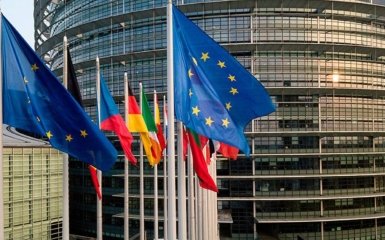The European Parliament supported the thematic report in support of the European Commission's proposals for the EU Directive on criminal liability and punishment for violations of EU restrictive measures by a majority of votes.
The European Parliament criminalised the circumvention of EU sanctions
Five hundred forty-three deputies voted "for" the mentioned document, 45 were against, and another 27 abstained.
In order to ensure the effective application of EU restrictive measures, it is necessary that member states have an effective, proportionate and effective system of penalties for individuals and legal entities that violate these EU restrictive measures... Circumvention of sectoral economic and financial measures must also find its answer.
The report provides a legal definition of cases of violation of the EU sanctions regime and their circumvention, including the actions of individuals or legal entities that, in particular, export prohibited goods through third countries or carry out transactions, realizing that their final consumer may be a jurisdiction that is subject to restrictive measures EU.
Following EU and national legislation of member states, persons committing such violations will be prosecuted and subject to financial penalties.
Income obtained through the violation of EU restrictive sanctions or the means used to violate the restrictive measures should be subject to confiscation. Where said assets are confiscated in connection with Russia's war of aggression against Ukraine or related crimes, without taking into account restitution and compensation to victims or communities in criminal proceedings, the confiscated assets or the net income derived from the liquidation of such assets, should be earmarked for efforts to rebuild Ukraine, the document says.
According to the provisions of the future Directive, the European Commission should develop instructions on the instruments of such confiscation on the treatment of profits and property intended for compensation, restitution and restoration. Member countries should be guided by such instructions, especially in a Russian war of aggression.
Penalties do not apply to goods or money transfers intended for daily personal use, particularly food, necessities and essential services of persons or their dependent family members. Operations and transactions related to providing humanitarian aid under the auspices of the UN or its associated humanitarian international organizations are also not subject to criminal liability.
According to the deputies, the directive should include minimum and proportional imprisonment and financial penalties as part of criminal prosecution for violating or circumventing EU sanctions.
In particular, for violations that led to financial losses of more than 50,000 euros, the minimum term of imprisonment is one year. For equipment of more than 100,000 euros, the minimum term of imprisonment increases to 5 years. The amount of fines is also established for these crimes. In particular, the levy on individuals or legal entities for violation of EU sanctions with the implementation of financial transactions or other measures of economic assistance using EU resources for an amount exceeding 100 thousand euros is set at a level of at least 10 million euros.
Member States will take the necessary measures to ensure that violations of EU restrictive measures by any natural, legal person, institution or organisation are prosecuted as a criminal offense if such actions are committed knowingly and fall under the conditions defined herein.
Actions subject to criminal liability include:
Direct or indirect provision of any funds or financial resources to persons or institutions subject to EU sanctions;
Permission for such persons to enter the territory of the EU, including its air and sea space, or transit through the territory of the EU or its member states.
Any transactions or government orders for the benefit of countries or institutions directly or indirectly under the control of third countries or institutions of third countries against which EU restrictive measures are applied.
If EU restrictive measures prohibited such actions, trade in goods, services or technologies, their import, export, sale, purchase, transfer, transit or transportation.
What was included in the 13th EU sanctions package against Russia?
Another 106 individuals and 88 legal entities were included in the sanctions lists. They are concerned, in particular, with the military and defence sectors. These companies and people are involved in the supply of weapons from North Korea to Russia and the deportation and hiding of Ukrainian children.
In general, EU restrictive measures regarding actions that undermine or threaten the territorial integrity, sovereignty and independence of Ukraine currently apply to more than 2,000 individuals and legal entities, the message specifies.
The EU Council has added 27 new subjects to the list of those directly supporting Russia's military-industrial complex. They are subject to stricter export restrictions on dual-use goods and technologies and those that help technologically improve Russia's defence and security sector.
Some of these companies and organizations are based in third countries - India, Sri Lanka, China, Serbia, Kazakhstan, Thailand and Turkey. They helped Russia circumvent sanctions and produce and develop electronic components for weapons.
The EU introduced additional restrictions on exporting electrical transformers and components for developing and producing drones.
The EU Council also added Great Britain to the list of partner countries that impose sanctions on importing iron and steel from Russia.
More on the topic
- Category
- Economics
- Publication date
- Додати до обраного
- Category
- Economics
- Publication date
- Додати до обраного
- Category
- World
- Publication date
- Додати до обраного




